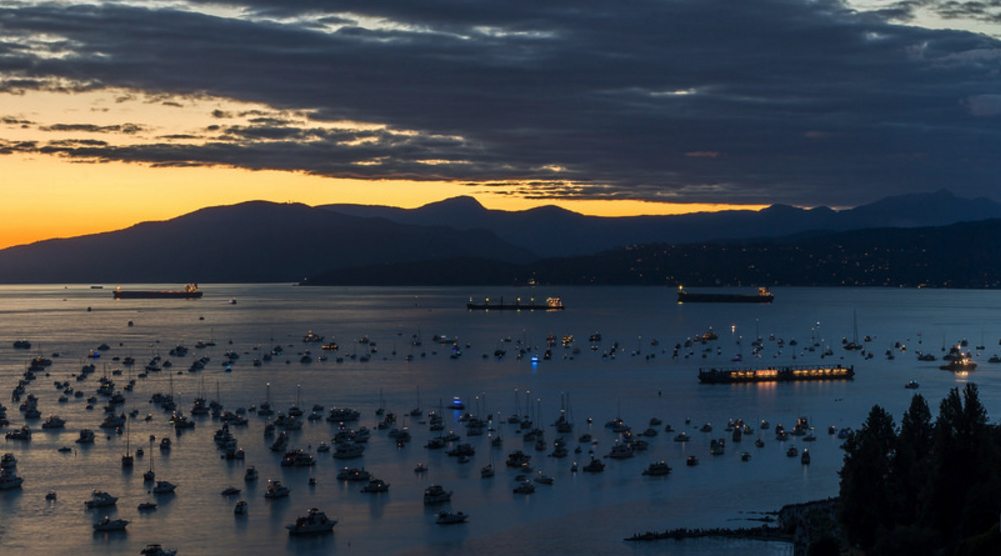
Fireworks are big business in the City of Vancouver, and are the centre piece of a summer “celebration of light” where we celebrate which country can make the most impressive display and percussion. Years ago it was a tobacco company that had its name on this festival-now it is a car manufacturer.
City Council has just announced that they will be approving $50,000 for a New Year’s Eve celebration downtown with live bands and two fireworks displays-one at 9:00 p.m. for families with kids, and one again at midnight.
Fireworks do produce light, noise and air pollution, although in the moment the light and noise are pleasurable to viewers. They also release chemicals and particle-laden haze. But what is the impact of fireworks on birds and animal life? Does it make a difference to make that kind of noise in the summer or the winter? And why is there so little written about the ecological impact of fireworks?
The Audubon Society cites the case of New Year’s Eve 2010 when 5,000 red-winged blackbirds were startled from their nests in Beebe Arkansas when professional grade fireworks were set off by amateurs. They died by colliding into buildings, cars and trees. It appears that fireworks are also more problematic in the winter months when large groups of birds cluster together at night.
There are other studies that show that shorebirds leave nests and become disoriented, including a 2011 study from a New Year’s Eve in the Netherlands that recorded thousands of birds taking flight for 45 minutes “clearly disturbed and stressed by the fireworks, with wetland areas and nature reserves being especially sensitive areas due to the large number of birds that gather there.”
The impact on whales in captivity of large percussion fireworks has also been studied and the National Oceanic and Atmospheric Association has set up standards for coastal areas where marine mammals and birds could be disturbed by fireworks. It can also be argued that fireworks are similar to natural occurring thunderstorms and lightning to wildlife.
There is no doubt that fireworks and celebrations have gone hand in hand in the 20th century. Are fireworks still ecologically appropriate in the 21st century? Or are fireworks so culturally tied to our ideas of celebration that any ecological impact is not important?














I always find it fascinating how easily impressed our society is. I see the fireworks as a representation of just how dull and ordered our lives are. I mean, we have food truck festivals of all things. What next? Port-a-pottie festivals? In Europe (and probably elsewhere) food trucks and port-a-potties are background infrastructure and fireworks are a sideshow.
Sure, fireworks are fun a few times. And it’s fine that kids get excited by them. But over and over and over again year after year after year. Yawn.It’s just weird that so many people would make so much effort to battle hundreds of thousands more people to get a spot hours before for a 25 minute show then leave in a panic the millisecond it’s over, battling the same hundreds of thousands in a mad frenzy of traffic and grossly overcrowded transit. Again, in Europe, fireworks tend to be another attraction at festivals that actually offer festivities. There is no frenzy to come and go just for some sparkly lights and booms.
Maybe we should start having festivals that are, you know, festivals. The demand is there. 30,000 people show up when we close a street for a day with very little actual festivity.
Yeah. I agree. Flashing lights and booming sounds are merely stimulating our sense of fright and surprise but if there are too many then it’s just background and we become numb to it. Festivals need to have more “nutrition” in them, not just chili pepper, sugar and salt. If not we won’t be satisfied. People want to have something genuine and enriching out of a festival.
Author
Reblogged this on Sandy James Planner.
Very good comment Sandy – I was thinking the same thing last summer as the haze of fireworks drifted over “the greenest City”. I’d love to see some air quality measurements taken during these events – there is likely some impact but it would be good to know what that is! Surprising that Vancouver doesn’t count this under one of it’s greenest city indicators…
5,000 red winged blackbirds died in Boston. Very sad. An elegant bird with a delightful song. Yet, there is an estimated 130 million red wing blackbirds and in the interest of preserving food crops for humans approximately 2 million red wing blackbirds are killed each year.
Fireworks are moronic, unpleasant, and anti-ecological.
How can this simulacrum of war be called a “celebration of light”. It’s something to excite the rubes from the burbs – an excuse to drive in and soil the city. Air, noise, and light pollution – a gross misallocation of resources from cleanup to policing; wear and tear on vehicles; wasted human energy.
How about celebrating an end to child poverty by not pissing away resources on idiocy.